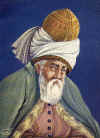|

Mevlana Jalal-e-Din
Mevlavi Rumi
- Biography
Birth
- Date:September 29, 1207
A.D. or 6th Rai'u-'l-avval 604 A.H.
Place:Balkh
in the north-eastern provinces of Persia (present day
Afghanistan).
Name
- Jalal-e-Din
Mohammad
Family
Full
TitleMevlana Jalal-e-Din Mohammad Mevlavi Balkhi
Rumi
Father:Baha'u-'d-Din Veled
Sultan-'l-Ulema
Mother:Unknown
Grandfather:Jalale-'d-Din
Huseyn el Khatibi
Grandmother:Malika'i Jihan - daughter of Khurram-shah King of
Khorasan
Brother:Ala'u-'d-Din (2 years
older)
Sister:Not known - Married and
remained in Balkh
Wife:Gevher
Khatun - daughter of Lala Sharafu-'d-Din of
Samarqand.
2nd Wife:Unknown
Children:Son -
Killed with Shams
Daughter - married a
local prince and left Qonya (Konya)
Son - Muhammad Baha'u-'d-Din Sultan Veled
Son
- unknown
Teachers
Childhood:Burhanu-'d-Din Serr-Daan el Muhaqqiq el Huseyni of
Balkh
Later in Life:Shams-e-Din
Muhammad Ibn Malik-dad Tabrizi
Important Events
Age 5:
His family left his birth-place of Balkh for
Baghdad
Age 8: From Baghdad to
Mecca and Damascus and finally to Malatia (in Western Euphrates
in Turkey)
Age 19: (1226
ad)Married Gevher Khatun
and finally moved to Qonya (Konya)
in the north-western provinces of Persia (in present day
Turkey).
Age 37: On
Saturdday, November 28, 1244 A.D. or 26th of Jamadi-ul0akhar 642
A.H., Rumi and Shams met
Age 39: On March 14, 1246, 21st Shewwal, 643, Shams left
Qonya and Rumi for the first time.
Poetry
Divan-e-ShamsA
compendium of poetry in praise of Shams in over 45,000 verses in
Farsi (Persian)
MathnaviRumi's
most famous work in 7 books, and 24,660 couplets, in Farsi and
some Arabic. This work is also commonly refered to as the
Persian Quoran.
Fihi ma FihiIntroductory discourses on
metaphysics
- Death
Date:At sunset of
December 16, 1273 A.D. 5th Jamadi-u-'l-Akhar 672 A.H. at the age
of 66 solar years or 68 Lunar years.
Place:At home in Qonya.
Information taken from
Divan-e-Shams in Farsi,
compiled by Taghi Jafary
Mathnavi in Farsi, compiled by
Ghadam-Ali Sarami
Menaqibu'L'Arefin - by the historian,
shams-e-Din Ahmed, El Eflaki, 1353, translated by James W.
Redhouse
|